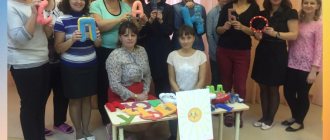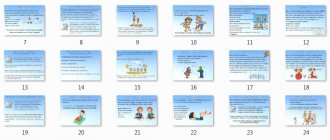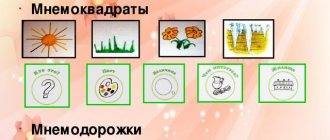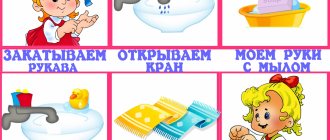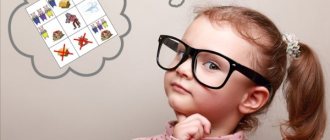Workshop for educators “Development of the cognitive and speech sphere of children”
Natalia Karnaukhova
Workshop for educators “Development of the cognitive and speech sphere of children”
Goal: To assist educators in choosing forms and methods for developing the cognitive-speech sphere of children .
Tasks:
— to identify the relevance of the problem of development of the cognitive-speech sphere of children ;
— introduce the techniques used in the formation of cognitive and speech development ;
Speech is a clear indicator of a child’s development . Scientists have proven that the speech of a child who is not prepared for school usually retains speech features characteristic of children of an earlier age and contains many errors:
-poor vocabulary;
- often incorrect sentence construction;
- inability to present events coherently and consistently;
-pronunciation defects;
- confused pace of speech.
Knowledge of the native language is one of the most important acquisitions of a child in preschool age. This is especially true now, since speech is disappearing from a child’s life. Children spend a lot of time in front of the TV, computer, some children are sometimes loaded with various “prestigious”
studios,
“literacy schools”
.
Adults brush off children's questions and rarely listen without interrupting. The correct language is not always used when communicating with a child. If they read books, they don’t discuss them. But a child desperately needs communication. Poor speech leads to aggression, since the child cannot always express in words what he wants to say. Hence the problem of vocabulary, the problem of pronunciation, the problem of expressiveness of speech. And one cannot fail to take into account the cultural crisis of society and, as a consequence, the low level of culture of the individual, family, and educational space as a whole.
Illiterate expressions, careless speech, reduction of vocabulary, loss of the very concept - culture of speech. The development of cognitive and speech activity is one of the most important sections of preschool pedagogy and is aimed at the mental development of the child . The better the cognitive and speech activity of children , the higher the guarantee of success in school education.
Work with children on cognitive and speech development includes :
-Classes on familiarization with the outside world, mathematics, development based on the active method;
-Joint design and research activities of children and teachers ;
-Exercises and games to develop the intellectual sphere of all aspects of speech in all age groups;
-Experimental activities;
- Correctional work on the development of speech and verbal communication;
- Joint games - fantasy;
-Joint activities in the book corner (conversations, mini quizzes, memorizing poems, reading, modeling fairy tales, composing stories).
The main tasks of cognitive and speech activity:
-Enrich the cognitive sphere of children with information through classes, observations, experimental activities, and speech.
-Enrich emotional and sensory experience in the process of direct communication with objects, phenomena, people.
-Help organize information about the world around you and form ideas of its integrity.
Develop a caring attitude towards the environment, consolidate positive emotions, and the ability to express them.
-Create conditions that facilitate the identification and maintenance of interests, the manifestation of independence in cognitive and speech activity.
-Maintain conditions for the development of cognitive and speech processes of preschool children in all types of activities.
Techniques used in the formation of cognitive and speech development :
-Visual - observations, looking at pictures, showing films, slides, presentations.
-Practical exercises, games, experiments and trials, modeling, project activities, research activities.
-Verbal - story, reading, questions, conversations, use of literary words.
To properly organize cognitive and speech development, the following areas can be distinguished:
The speech of the teacher himself, which has a general and educational orientation . When working with children, we must remember that children who spend most of their time in kindergarten, communicating with us, learn a lot from us, including the culture of speech, and perceive our speech as a model. Therefore, we try to speak without distorting sounds, without eating up endings. It is especially important to clearly pronounce long or unfamiliar words introduced into the children's dictionary.
Formation of ideas about the surrounding world. After all, a preschooler encounters new objects and phenomena every day. But the accumulation of knowledge and ideas without appropriate guidance will be superficial or erroneous. Often a child thinks that clouds are cotton wool because they are white, stars are light bulbs because they glow. After all, observing natural phenomena, he independently came to this conclusion. Therefore, our main task is for the child to receive clear, in accordance with the return, ideas about surrounding objects, their purpose, qualities, the materials from which they are made, where, by whom, and for what they are used.
Developing curiosity . We must support the child’s curiosity by organizing activities, observations, trying to answer questions that arise in a timely manner and in an understandable language, directing children’s thoughts to independently search for an answer and the ability to draw conclusions.
Sensory education . The higher the level of their development , the richer the opportunities for understanding the surrounding world . The content of sensory education includes the development of auditory sensitivity, tactile sensitivity, that is, the ability to distinguish and name the qualities of objects.
A game. One of the most effective means of cognitive and speech development of preschool children . And if during organized educational activities a child gains knowledge, then during play he has the opportunity to reflect knowledge about the world around him, share this knowledge with friends, and find like-minded people of interest. Certain types of games have different effects on cognitive and speech development .
For preschool children, cognitive and speech development is a complex phenomenon that includes the formation of mental processes. children will not have problems mastering the tasks .
Family and kindergarten cannot replace each other; each of them has its own functions, its own methods of education . They need to learn to interact in the interests of the child. We believe that the main thing in this direction is to establish trust between the family and the kindergarten.
In our kindergarten, conditions have been created for organizing a unified space for the development and upbringing of a child , which provides pedagogical support for the family at all stages of preschool childhood and makes parents responsible participants in the educational process.
For example, “Information stand”
- gives parents complete information about interesting events in the lives of their
children in kindergarten , so that they can talk with their child about it at home or on the way from kindergarten.
Contains announcements about meetings, holidays and other events, requests for various assistance, thanks for the participation of parents in the life of the kindergarten. "Creativity Stand"
- is decorated with the creative works
of children , teachers , and parents. Such work involves the exchange of experience, knowledge, and materials. The creative work of each participant individually involves achieving a common result and unites the interests of children , parents and educators .
Here's what you can suggest to parents:
Developing the cognitive and speech sphere in the kitchen.
There is an opportunity to develop the child’s vocabulary , grammar, and phrasal speech on the following topics: “Family”
,
“Fruit”
,
“Dishes”
,
“Food”
,
“Household Appliances”
, etc.
Here you can tell your son or daughter what the products are called, what dish you prepare, and what actions you perform.
Name the properties (color, shape, size, taste)
products (hot, cooled, sweet, spicy, fresh, stale, etc., ask the child relevant questions (
“Try what kind of salad turned out?”
,
“What else can we put in the soup?”
,
“Which carrot will we choose?”
, etc. .).Be sure to name your actions (
“cut”
,
“mix”
,
“salt”
,
“fry”,
etc., show the child what you are doing and how. The child must repeat the words. Entrust him with all possible help in the kitchen. In activity, speech material is absorbed much faster and more naturally.
If the child is still small and awkward, let him work nearby with his toy dishes and products, copy words and actions: prepare food for dolls and feed them, wash dishes, wipe the table. And he always talks about what he does.
On almost any visual material around us, speech games such as “The Fourth Wheel”
,
“What’s missing?”
,
“What changed places?”
,
“What has changed”
,
“Win the couple”
,
“Who suits what”
,
“Call it affectionately”
,
“Turn it into a huge one”
,
“Pick up 5 signs”
,
“Guess what I’m talking about”
,
“Say the opposite”
, etc. .
A great activity for training fine motor skills is to sculpt dough figures together. The dough recipe is easy: water, flour, salt, a little vegetable oil. The dough should be salty, otherwise the baby will not want to try it. The resulting figures can be painted, decorated with buttons, cereals, pasta, etc.
String different pasta with a hole inside. These can be tubes, rings and even flowers. Invite your child to make beads by stringing pasta onto a thick thread. For convenience, you can tie a match or a small stick to the end of the thread to make it easier to insert it into the pasta, or use an ordinary shoelace.
You can feed the worm: the worm is a string, and the pasta is food. We string it, and the worm becomes fat and well-fed.
-Serve and decorate the table with your child. Arrange food on your plate in the shape of a picture. For example, create compositions: a cucumber boat, a radish flower, a kebab on a skewer from multi-colored pieces of vegetables with cheese or fruit. This activity perfectly develops children's imagination and imagination .
Development of the cognitive-speech sphere in the bathroom.
Taking a bath is a great and fun way to end the day.
All you need to do is offer interesting tasks and experiments, and also talk with the child from time to time, replenishing his vocabulary with new concepts and encouraging him to think.
For playing with water, you can use sponges of different shapes, jars marked with milliliters, objects that can float and, conversely, sink (toy boats, ducklings, plastic containers, pieces of wood, pebbles, shells, funnels of different sizes, foam and bath salts of different colors .
All bath games involve exploring the properties of objects. For example, place a plastic container on water. Place a small toy in the container. Then another one. Load the container with your baby until he begins to sink. Explain to the child why he went down.
Children are not always able to make discoveries in everyday life on their own; they need to be taught to observe.
Development of the cognitive-speech sphere during a walk.
Walking outside is definitely beneficial for a child. Jumping in the fresh air is much more interesting than sitting at home within four walls. In addition, walking can not only improve your health, but also develop your baby’s speech . It is on the street that a child develops curiosity, which is easy to satisfy. What words a child will use to name objects around him directly depends on the parents. Using certain words and intonation, the mother teaches the baby to characterize situations and objects around correctly.
While walking, try to talk more with your child, name everything you see around, pay attention to the baby’s gaze, what he is interested in. Tell us what people around you are doing, explain why everything happens this way. The baby is accumulating his passive vocabulary, and the time will come when he will reproduce everything he heard once.
Workshop on speech development of preschool children for teachers of preschool educational institutions. - presentation
Workshop on speech development of preschool children for teachers of preschool educational institutions
Preschool age is a period of active acquisition by a child of spoken language, the formation and development of all aspects of speech: phonetic, lexical, and grammatical.
Expanding the circle of communication requires the child to fully master the means of communication, the main one of which is speech.
Stages of speech development in children Stage 1 Preparatory (from birth to 1 year). Preparation for mastering speech occurs. Stage 2 Pre-preschool (from 1 year to 3 years). With the appearance of the first words, the stage of formation of active speech begins. Stage 3 Preschool (from 3 to 7 years). Formation of phonemic perception, increase in vocabulary, development of grammatical structure of speech, monologue speech. Stage 4 School (from 7 to 17 years old). Children master sound analysis, learn grammatical rules for constructing statements, and develop written speech.
Teacher’s speech Relevance (use of units appropriate to the situation and conditions) Richness (ability to use all language units) Purity (absence of elements alien to the literary language) Expressiveness (intonation, tempo, strength, pitch of voice, etc.) Logicity (expression in semantic connections of speech components) Correctness (compliance with language norms) Accuracy (compliance with semantic content and information)
has a good command of oral speech, can use speech to express his thoughts, feelings and desires, construct a speech utterance in a communication situation, can highlight sounds in words, the child has the prerequisites for literacy Targets at the stage of completing preschool education
formation of oral speech and verbal communication skills with others based on mastery of the literary language.
mastery of speech as a means of communication and culture enrichment of the active vocabulary development of coherent, grammatically correct dialogical and monologue speech development of speech creativity formation of sound analytical-synthetic activity as a prerequisite for learning to read and write development of sound and intonation culture, phonemic hearing familiarity with book culture, children's literature, understanding of hearing texts from various genres of children's literature
1. Vocabulary development: mastering the meanings of words and their appropriate use in accordance with the context of the utterance, with the situation in which words are communicated By the end of 1 year of life up to words By the end of 2 years of life up to 1500 words By the end of 3 years of life up to 1900 words K end of 4 years of life up to By the end of 5 years of life up to words 6 – 7 years
2. Nurturing the sound culture of speech: development of perception of the sounds of native speech and pronunciation 3. Formation of grammatical structure: Morphology (changing words by gender, number, case) Syntax (mastering various types of phrases and sentences) Word formation
4. Development of coherent speech: Dialogical (conversational) speech Monologue speech (storytelling) 5. Formation of sound analytical-synthetic activity as a prerequisite for learning to read and write
6. Fostering love and interest in the literary word Children's literature is fiction, non-fiction and popular science works written specifically for children from preschool to high school age.
Author of the presentation template: Ranko Elena Alekseevna
